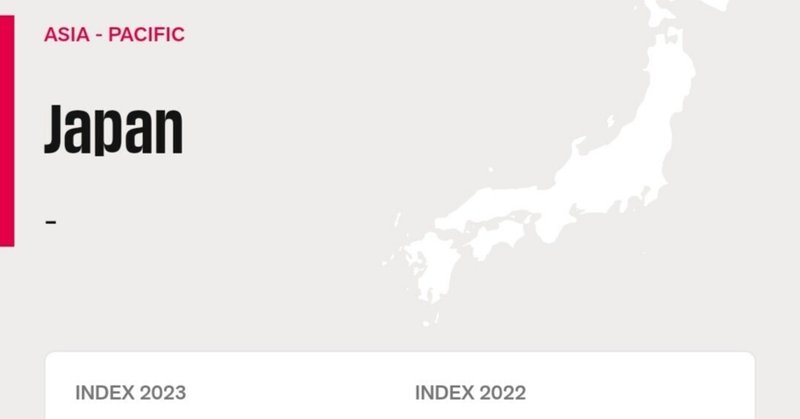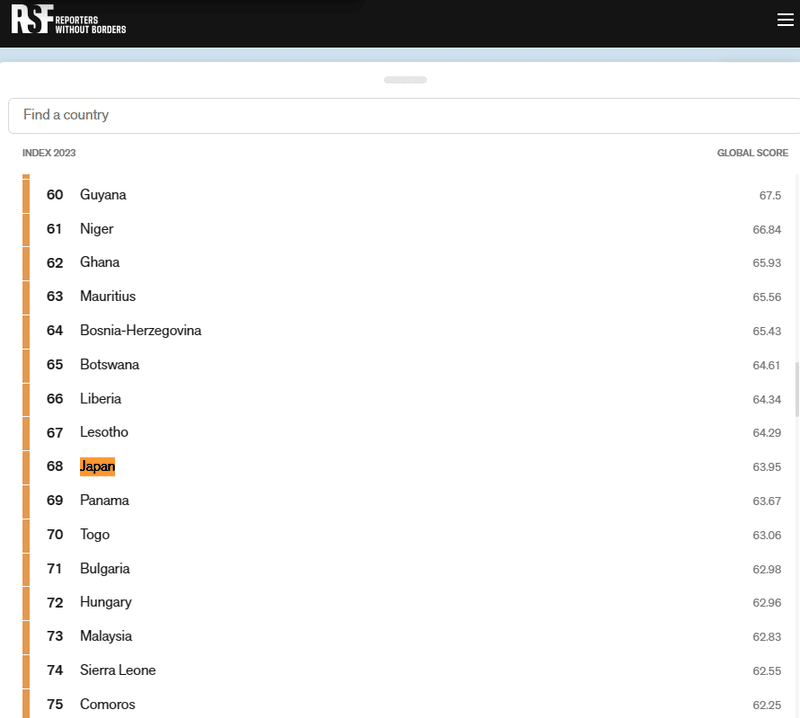
【英日対訳】「国境なき記者団」による2023年度『報道の自由度ランキング』68位となった日本🗾の評価の詳細 #報道の自由度ランキング #国境なき記者団
はじめに
2023年5月3日、日本のゴールデンウィーク連休中に国際NGO「国境なき記者団」 (英語名: Reporters Without Borders | 正式名: Rapporteurs Sans Frontiers: RSF) が2023年度『報道の自由度ランキング』を発表しました。
日本は総合68位で、前年度の71位に比べて3ポイントは向上したものの、依然として危険領域(オレンジ領域) に留まり、G7諸国では引き続き最下位となりました。

評価の順位や項目については各種報道がなされましたが、評価の内容、総論や各論についての報道は今年みかけた記憶がありません。昨年(2022年度)は調査報道を行う独立系メディア「Tansa」が詳細に報じ、総合評価を含め、総論も各論も全訳してくれていました。ところが今年はそれもなく、まさにどのメディアも詳細な報道を行っていない状態なので、遅ればせながら和訳しました。時間の関係でDeepL訳をPE修正する形をとっています。
👓編集長コラム第9回 自滅の71位
— Tansa/探査報道メディア (@Tansa_jp) May 11, 2022
今年度の #報道の自由度ランキング が発表された。日本の大手マスメディアは具体的な理由をほとんど割愛して順位を報じたが、国境なき記者団は次のように分析している。これを読めば、大手マスメディアには不都合な内容であることが分かる。https://t.co/vQiL40XBll
本編
総評

2023年度指標 68/180位
2022年度指標 71/180位
総合スコア: 63.95
「政治」83位 / 55.75
「経済」47位 / 56.32
「立法」73位 / 66.39
「社会」105位 / 59.32
「安全」60位 / 81.90
概要

Japan, a parliamentary democracy, upholds the principles of media freedom and pluralism. However, the weight of traditions, economic interests, political pressure, and gender inequalities prevent journalists from fully exercising their role of holding the government to account.
議会制民主主義国家である日本は、報道の自由と多元主義の原則を掲げている。しかし、伝統や、経済的利益、政治的圧力、ジェンダー不平等などの重圧により、ジャーナリストが政府の責任を追及するという役割を十分に発揮することができないでいる。
◇報道を取り巻く環境

In Japan, traditional media remain more influential than news websites. Mainstream newspapers and broadcasters are owned by the country’s five major media conglomerates: Yomiuri, Asahi, Nihon-Keizai, Mainichi, and Fuji-Sankei. Yomiuri and Asahi have one of the highest newspaper circulations in the world, with 6.8 million and 4 million copies a day, respectively. At the same time, Nippon Hōsō Kyōkai (NHK) is the second largest public broadcaster in the world.
日本では、ニュースサイト等よりも伝統的なメディアに影響力がある。主要な新聞社や放送局は、日本の五大メディアコングロマリット(読売、朝日、日経、毎日、フジササンケイ)によって所有されている。読売と朝日が、それぞれ日680万部、400万部と、世界でも有数の新聞発行部数を誇っているのと同時に、日本放送協会(NHK)は世界で2番目に大きな公共放送局でもある。
◇政治的背景

Since 2012 and the rise to power of the nationalist right, many journalists have complained about a climate of mistrust, even hostility, toward them. The system of ‘kisha clubs’ (‘reporters’ clubs), which only allows established news organisations to access government events and to interview officials, induces journalists into self-censorship and represents blatant discrimination against freelancers and foreign reporters.
2012年以降、国粋主義右派の台頭により、多くのジャーナリストが、ジャーナリストに対する不信感、さらには敵意さえ抱く風潮に不満を抱いている。「記者クラブ」と呼ばれる制度は、既成の報道機関にのみ政府行事への参加や政府関係者への取材を認め、ジャーナリストを自己検閲に陥れ、フリーランス記者や外国人記者に対する露骨な差別の温床となっている。
◇法的枠組み

Vaguely worded regulations, enacted in 2021 and first applied in 2023, restrict public (including journalists) access to 58 areas near defence facilities and infrastructure deemed of “national security interest”, such as the Fukushima power plants, under penalty of two years in prison and/or a fine of up to 2 million yen (about US$18,240). The government also refuses to amend a law on the protection of specially designated secrets, which punishes the publication of information obtained “illegally” with up to ten years in prison.
2021年に制定され、2023年に初適用された曖昧な表現の規制は、福島原発等の「国家安全保障上の利益」とみなされる防衛施設やインフラ施設に近い58の区域への一般市民(ジャーナリストを含む)の立ち入りを制限し、懲役2年または200万円以下の罰金あるいはその両方を科す。政府はまた、「違法に」入手した情報の公開に最高10年の懲役を課す「特定秘密保護法」の改正も拒否している。
◇経済的背景

In this world's most aged country, the paper-centred model remains the main economic model, but its future is uncertain due to the decline of its audience. Japan does not have regulation against the cross ownership of newspapers and broadcast stations, which has led to an extreme media concentration and the growth of media groups of considerable size, sometimes with over 2,000 reporters.
世界で最も高齢化が進んだこの国では、紙を中心としたモデルが主要な経済モデルであり続けているが、オーディエンスの減少によりその将来は不透明である。日本には新聞社と放送局のクロスオーナーシップ(相互所有)に対する規制がないため、極端なメディア集中が進み、2,000人以上の記者を抱える相当規模のメディアグループの成長に繋がっている。
◇社会文化的背景

The Japanese government and businesses routinely apply pressure on the management of mainstream media, which results in heavy self-censorship on topics that could be deemed sensitive, such as corruption, sexual harassment, health issues (Covid-19, radiation), or pollution. In 2020, the government dramatically reduced the number of journalists invited to its press conferences, using Covid-19 health measures as an excuse, and included public broadcaster NHK on the list of organisations supposed to follow its “instructions” in the case of a major national crisis.
日本の政府と企業は日常的に主流メディアの運営に圧力をかけており、その結果、汚職、セクハラ、健康問題(新型コロナ、放射能)、公害など、デリケートな問題とみなされるテーマで激しい自己検閲が行われている。2020年、政府は新型コロナへの感染対策を口実に記者会見に招待するジャーナリストの数を大幅に減らし、公共放送のNHKを、「重大な国家危機」が発生した場合に政府の「指示」に従うべき組織のリストに加えた。
◇安全性

While Japanese journalists enjoy a relatively safe working environment, some have been sued by politicians simply for retweeting content deemed “defamatory”. On social networks, nationalist groups also routinely harass journalists who criticise the government or cover “unpatriotic” subjects, such as the health problems caused by the Fukushima disaster. In an isolated incident in December 2022, the Foreign Correspondents' Club of Japan received several disturbing phone calls threatening to bomb the club and kill two of its journalists.
日本のジャーナリストは比較的安全な労働環境を享受しているが、中には「中傷的」とみなされる内容をリツイートしただけで、政治家から訴えられるケースもある。ソーシャルネットワーク上では、国粋主義集団が、政府を批判したり、福島原発事故による健康問題など「反愛国的」とみなされるテーマを取り上げるジャーナリストに対して日常的に嫌がらせを行っている。2022年12月の孤立した事案では、日本外国特派員協会に対し、「協会ビルを爆破し、2人のジャーナリストを殺す」という脅迫電話が数回かけられたこともあった。
前年度比較
22年度結果の検証スレッド
#国境なき記者団 が発表した #報道の自由度ランキング について、NHK等主要メディアが「大企業の影響力がメディアに自己検閲を促している」と報じた内容は、日本単体ではなくアジア太平洋地域に言及している分析箇所から抄訳したものであることがわかった。以下検証結果のスレッド。 #報道の自由 pic.twitter.com/8QwYuuNSVL
— 💫T.Katsumi🏳️🌈📢 (@tkatsumi06j) May 7, 2022
22年度結果検証スレッドのまとめ
noteをご覧くださりありがとうございます。基本的に「戦う」ためのnoteですが、私にとって何よりも大切な「戦い」は私たち夫婦のガンとの戦いです。皆さまのサポートが私たちの支えとなります。よろしくお願いいたします。
